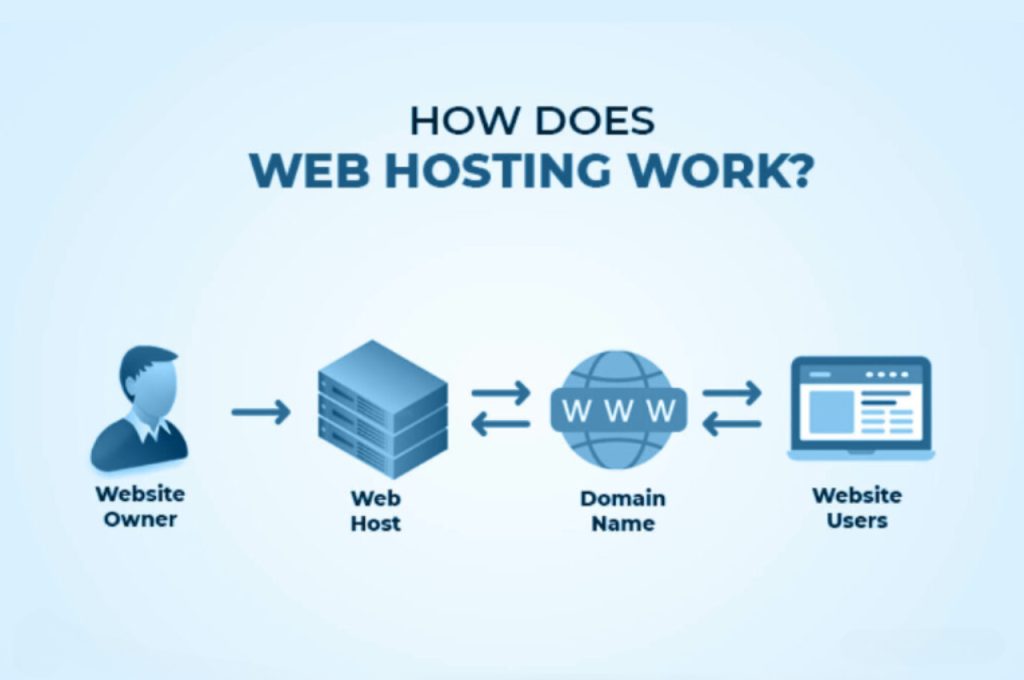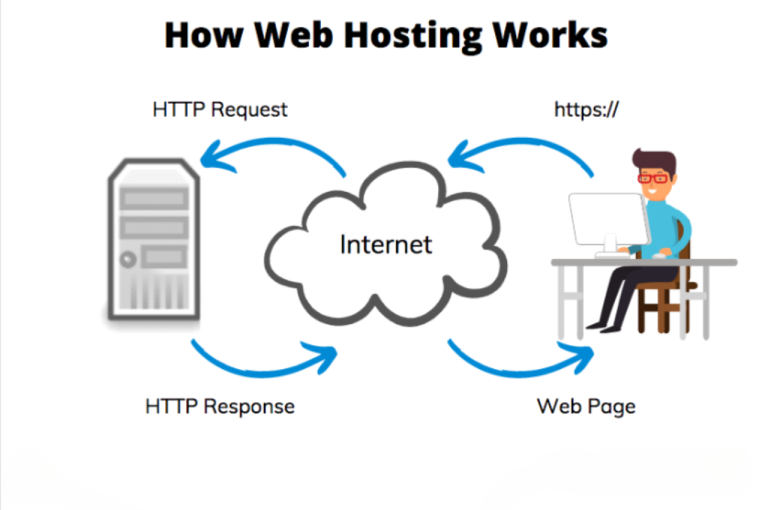Web hosting works by storing website files on a server, making them accessible on the internet. When a user visits a website, the browser connects to the server to retrieve and display the content.
This process allows websites to be live and available for visitors worldwide. Web hosting is essential for businesses and individuals looking to establish an online presence. Without reliable hosting, websites would not be able to function properly, leading to potential loss of visitors and business opportunities.
Choosing the right web hosting provider is crucial for ensuring website performance, security, and overall user experience. We will explore how different types of web hosting services function and the key factors to consider when selecting a hosting plan.
Table of Contents
The Basics of Web Hosting
Web hosting makes websites accessible on the internet by storing their data on servers. When someone searches for a website, the browser connects to the server, retrieves the content, and displays it. This process happens in a split second, allowing users to access websites seamlessly.

Types of Web Hosting
Web hosting comes in different types suited for diverse website needs.
- Shared Hosting: Websites share server resources with others.
- VPS Hosting: A Virtual Private Server provides dedicated resources.
- Dedicated Hosting: Entire server resources exclusively for one website.
- Cloud Hosting: Scalable resources from multiple servers in a network.
How Web Hosting Works
Web hosting involves storing website files on specialized servers connected to the internet.
- Domain Registration: Choose and register a unique website domain.
- Upload Files: The web developer uploads website files to the hosting server.
- DNS Settings: Domain Name System settings connect the domain to the hosting server.
- Visitor Access: The website is accessible online for visitors worldwide.
Choosing the Right Web Hosting Provider
When it comes to web hosting, selecting the right provider is crucial for ensuring your website runs smoothly and efficiently. With numerous options available in the market, it may seem overwhelming to find the perfect fit for your needs. In this article, we will explore the factors to consider when choosing a web hosting provider, as well as some popular options that you can explore.
Factors to Consider
When selecting a web hosting provider, there are certain factors that you should carefully consider. These factors will help you determine which provider can offer the best services to meet your specific requirements:
- Reliability: Ensure that the hosting provider offers a reliable service with minimum downtime. Your website’s availability and performance are dependent on the reliability of the hosting provider.
- Scalability: Consider your future growth plans for your website. Choose a provider that can efficiently handle increased traffic and provide scalable hosting solutions as your website expands.
- Speed: Website loading time plays a crucial role in user experience and search engine rankings. Look for a hosting provider that offers fast server speeds and optimized performance for your website.
- Security: Protecting your website from cyber threats is essential. Ensure that the hosting provider offers robust security measures such as SSL certificates, regular backups, and firewalls to safeguard your data.
- Customer Support: In case of any technical issues or concerns, having reliable customer support is vital. Look for a hosting provider that offers 24/7 support through multiple channels like live chat, email, or phone.
Popular Web Hosting Options
Now that you are aware of the factors to consider, let’s explore some popular web hosting options:
| Shared Hosting: | Most suitable for small websites or beginners, shared hosting involves multiple websites sharing server resources. |
| VPS Hosting: | If you require more control and resources, virtual private server (VPS) hosting offers a dedicated portion of a server for your website. |
| Dedicated Hosting: | For websites with high traffic and resource-intensive requirements, dedicated hosting provides an entire server exclusively for your website. |
| Cloud Hosting: | Cloud hosting utilizes multiple interconnected servers to provide top-level performance, scalability, and reliability. |
| WordPress Hosting: | Designed specifically for WordPress websites, this hosting option offers optimized performance and enhanced security features for WordPress users. |
Consider your website’s unique needs and goals, budget, and technical knowledge when choosing the right web hosting provider and option for your online presence.
Key Components of Web Hosting
Web hosting is made possible by several key components that work together seamlessly to ensure websites are accessible to users around the world. Understanding these essential elements of web hosting is crucial to appreciate how websites are stored, managed, and delivered to users.
Server Hardware
Server hardware forms the physical foundation of web hosting. It comprises powerful computers designed to store and deliver website data to users on the internet. These servers run specialized software to manage website files, databases, and various applications.
Data Center Infrastructure
Data center infrastructure refers to the physical facilities where servers are housed and maintained to ensure optimal performance and reliability. These data centers are equipped with features like redundant power supplies, cooling systems, and advanced security measures to safeguard the servers and data they store.
Understanding Domain Names
A domain name is a unique address that allows people to access your website on the internet. It acts as the online identity of your website, making it easy for your visitors to find you. It is important to understand domain names and their significance in the web hosting process.

Importance of Domain Names
Your domain name plays a crucial role in establishing your online presence. It not only represents your brand but also affects your website’s SEO and credibility. Here are a few reasons why domain names are vital:
- Memorability: A well-chosen domain name that reflects your business or represents your brand makes it easier for visitors to remember and revisit your website.
- Brand Recognition: A domain name that matches your brand name reinforces your brand image and helps in building credibility and trust with your audience.
- Search Engine Optimization (SEO): Having relevant keywords in your domain name can improve your website’s visibility in search engine results, helping you attract more organic traffic.
- Professionalism: A professional-looking domain name gives your website a more polished and trustworthy appearance.
Domain Registration Process
The domain registration process involves selecting and registering a unique domain name with a domain registrar. Here is a simplified overview of the process:
- Choose a Domain Registrar: Select a reputable domain registrar that suits your needs and budget.
- Search for Availability: Use the registrar’s search tool to check if your desired domain name is available.
- Select a Domain Extension: Choose the appropriate domain extension (such as .com, .net, .org) that aligns with your website’s purpose.
- Provide Relevant Information: Enter your contact details, including name, address, and email, as well as other required information for registration.
- Make Payment: Complete the registration process by making the necessary payment for the domain name.
- Verify and Activate: Confirm your registration via email or other verification methods, and your domain will be activated within a short period.
Understanding domain names and their importance can help you make informed decisions when selecting and registering your domain. It is a crucial step towards establishing your online presence and ensuring a smooth web hosting experience.
Security Measures in Web Hosting
Security measures in web hosting are essential for safeguarding websites and protecting sensitive data from potential threats. Web hosting providers implement various security measures to ensure the safety and integrity of their clients’ websites. These measures include SSL certificates, firewall protection, and other advanced security features.
SSL Certificates
SSL certificates, or Secure Sockets Layer certificates, are cryptographic protocols that provide secure communication over the internet. When a website has an SSL certificate, the data exchanged between the web server and the user’s browser is encrypted, ensuring that it cannot be easily intercepted or tampered with by malicious third parties. This encryption is particularly crucial for websites that collect sensitive information, such as credit card details or personal data.
Firewall Protection
Firewall protection is a vital component of web hosting security. Firewalls act as a barrier between a website’s server and the internet, monitoring and controlling incoming and outgoing network traffic. They help prevent unauthorized access to the server and block malicious attempts to compromise the website’s security. A well-configured firewall is essential for safeguarding against various online threats, including hacking attempts and malware infections.
Managing Web Hosting Services
Web hosting services involve a range of management tasks that ensure your website runs smoothly and efficiently. From control panel options to website backup strategies, managing web hosting services is an essential part of maintaining a successful online presence.
Control Panel Options
When it comes to managing web hosting services, selecting the right control panel option is crucial for efficient website management. Popular control panels like cPanel provide user-friendly interfaces, allowing you to manage your website, domains, databases, and more with ease. With a control panel, you can effortlessly install applications, manage files, and monitor website performance.
Website Backup Strategies
Implementing robust website backup strategies is vital for safeguarding your website’s data and ensuring quick recovery in the event of data loss or website issues. Scheduled backups, both on-site and off-site, offer peace of mind by preserving your website content, databases, and settings. With automated backup solutions, you can mitigate the risk of data loss and maintain the integrity of your website.
Scalability and Performance Optimization
Scalability and performance optimization are crucial aspects of web hosting when it comes to ensuring your website can handle sudden traffic increases and deliver an exceptional user experience consistently.
Scaling Resources
Scaling resources involves adjusting your web hosting plan to accommodate varying levels of traffic based on your website’s needs.
- Upgrade server resources as your website grows to meet increasing demands.
- Consider cloud hosting for flexible scalability and resource allocation.
Website Speed Optimization Tips
Optimizing website speed is essential for user satisfaction and search engine rankings.
- Compress images and enable browser caching to reduce load times.
- Minimize HTTP requests and utilize content delivery networks (CDNs) for faster delivery.
Emerging Trends in Web Hosting
Web hosting continues to evolve, adapting to the changing needs and preferences of website owners. Keeping up with the emerging trends in web hosting is crucial for businesses and individuals looking to establish a strong and reliable online presence. In this blog post, we will explore two major trends that are revolutionizing the web hosting industry: Cloud Hosting and Green Web Hosting Initiatives.

Cloud Hosting
Cloud hosting has gained immense popularity in recent years due to its numerous advantages. Instead of relying on a single physical server, cloud hosting operates across multiple interconnected servers, forming a virtual network. This distributed hosting solution ensures that website data is not stored in a single location, improving reliability and reducing the risk of downtime.
With cloud hosting, websites can easily scale resources up or down based on their fluctuating needs. This flexibility allows businesses to handle sudden traffic spikes efficiently without the worry of their website crashing. Additionally, cloud hosting provides better security measures, as the data is replicated across multiple servers, reducing the risk of data loss due to hardware failure or disasters.
Green Web Hosting Initiatives
In an era of increasing environmental consciousness, green web hosting initiatives are gaining momentum. With the rapid growth of the internet, data centers and servers consume a significant amount of energy. Green web hosting aims to minimize the carbon footprint of these operations by utilizing renewable energy sources and adopting energy-efficient practices.
Several web hosting providers have started investing in renewable energy sources such as solar and wind power to power their data centers. Additionally, energy-efficient hardware and cooling systems are being implemented to reduce overall energy consumption. The adoption of these green practices not only benefits the environment but also showcases a company’s commitment to sustainability.
By opting for green web hosting, businesses and individuals can contribute to the global effort of reducing carbon emissions while maintaining reliable website performance.
Conclusion
Understanding web hosting is crucial for online presence. Selecting the right hosting service ensures smooth website operation. With various hosting options available, finding the ideal fit is essential. Reliable web hosting plays a pivotal role in website performance and user experience.
Regularly maintaining and monitoring hosting is key to success.
